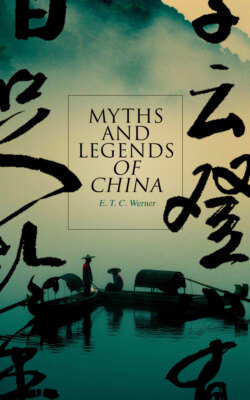Читать книгу Myths and Legends of China - E. T. C. Werner - Страница 53
На сайте Литреса книга снята с продажи.
Phases of Chinese Myth
ОглавлениеWe cannot identify the earliest mythology of the Chinese with that of any primitive race. The myths, if any, of their place of origin may have faded and been forgotten in their slow migration eastward. We cannot say that when they came from the West (which they probably did) they brought their myths with them, for in spite of certain conjectural derivations from Babylon we do not find them possessed of any which we can identify as imported by them at that time. But research seems to have gone at least as far as this—namely, that while we cannot say that Chinese myth was derived from Indian myth, there is good reason to believe that Chinese and Indian myth had a common origin, which was of course outside of China.
To set forth in detail the various phases through which Chinese myth has passed would involve a technical description foreign to the purpose of a popular work. It will sufficiently serve our present purpose to outline its most prominent features.
In the earliest times there was an 'age of magic' followed by an 'heroic age,' but myths were very rare before 800 B.C., and what is known as primitive mythology is said to have been invented or imitated from foreign sources after 820 B.C. In the eighth century B.C. myths of an astrological character began to attract attention. In the age of Lao Tzu (604 B.C.), the reputed founder of the Taoist religion, fresh legends appear, though Lao Tzu himself, absorbed in the abstract, records none. Neither did Confucius (551–479 B.C.) nor Mencius, who lived two hundred years later, add any legends to history. But in the Period of the Warring States (500–100 B.C.) fresh stimuli and great emotion prompted to mythological creation.
